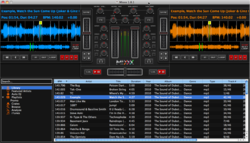- Mixxx
-
Mixxx 

A screenshot of Mixxx running on Mac OS XInitial release 2001 Stable release 1.9.2 / November 6, 2011 Preview release 1.10.0-beta1 / November 6, 2011 Operating system Cross-platform Available in C++, JavaScript Type Audio Mixing License GPL (free software) Website mixxx.org Mixxx is open source digital DJ’ing software that allows an individual to mix music together using a personal computer, as a DJ would with a pair of physical turntables. It is specifically suited to the style of mixing known as beatmatching. [1]
Contents
Overview
The project was started in early 2001 for a doctoral thesis as one of the first digital DJing systems.[2] Today it is a polished application that is downloaded over one million times annually (as of 2010)[3] and includes many features common to digital DJ solutions as well as some unique ones: It natively supports advanced MIDI DJ controllers, is licensed under the GPL (v2.0 or later) and runs on all major desktop operating systems.[4]
In November 2011, Mixxx 1.9.2 and Mixxx 1.10.0 Beta were released[5]. The most notable new features in Mixxx 1.10.0 Beta are:
- Rewritten vinyl control support.
- 4 Sample Decks
- Beatlooping and Loop/Hotcue/Beatloop Quantization
- Waveform and vinyl widget scratching
- Microphone Support
- Library Improvements
- Latency and mixing efficiency improvements.
- Over one hundred bugfixes.
In February 2011, Mixxx 1.9.0 was released[6] , the most notable new features are:
- Shoutcast / Icecast support for broadcast over the internet
- Routing each playback deck separately, which allows you to use Mixxx with an external mixer
- ReplayGain normalization for volume normalization, including performing the ReplayGain analysis for tracks which are not tagged
- Waveform Gain now scale waveforms according to the channel gain for better visual feedback
- HSS1394[7] support on Windows and MacOS X for firewire MIDI devices such as the Stanton SCS.1 series [8]
- Improved metadata parsing and metadata writing to write changes in song metadata back to disk
In October 2010, Mixxx 1.8.1 was released[9], most notably featuring multiple MIDI device support, looping, hot cues, a re-written library with more features, and some reduction in CPU usage.
In August 2009, Mixxx 1.7.0 was released[10], most notably featuring advanced MIDI controller support with full feedback. This version has undergone many stability improvements since the 1.6 series and introduces a native 64-bit Windows binary & Mac OS X Universal binary (so it can run on v10.4 and up on PPC and Intel CPUs.)
Audio file support
Mixxx can read most popular audio formats, including MP3, Ogg Vorbis, WAVe, AIFF and FLAC. v1.8 introduces a plug-in system to be able to read other formats, including patent-encumbered ones whose decoders cannot legally be distributed in binary form with Mixxx such as M4A/AAC/MP4. Any such plug-ins are automatically loaded at run-time if present.
Audio API/hardware support
Mixxx supports ASIO, WASAPI and DirectSound on Windows, OSS, ALSA, and JACK on Linux, and CoreAudio on Mac OS X. This means that any sound device that is supported by the operating system is usable in Mixxx.
Controller hardware support [11]
For external hardware control, Mixxx supports many MIDI controllers[12] and is the only DJ software using JavaScript for advanced controller interaction and feedback (introduced in v1.7.0.)[13]
Standard analog turntables are also supported via the vinyl control sub-system which is built on xwax.
Mac App Store
Mixxx is one of the first Free and open-source applications available in the Mac App Store. In less then 48 hours since it went live in February 2011[14] Mixxx has become the #1 Top Free App in the USA, Germany, and Italy. [15]
Exclusive to the Mac App Store, a new audio decoder that harnesses Core Audio brings M4A playback support to Mixxx out-of-the-box.
External links
- Official website
- wiki, including HOWTOs and tutorials
- An older Tutorial
References
- ^ James, Daniel. "Drafting Digital Media". Apress, 2009, p. 213.
- ^ T. H. Andersen. Live DJ interaction with sound. Doctoral Colloquium at NordiCHI, Aarhus, Denmark, October 2002.
- ^ Digital Dj Tips: "Get Your Mixxx for Free!" 14 October 2010, Retrieved on 4 Nov 2011
- ^ Skratchworx: "Mixxx with 3 Xs - one for each supported OS" 7 Aug 2009, Retrieved on 4 Nov 2011
- ^ Mixxx blog: 1.9.2 and 1.10.0 beta release announcement 06 Nov 2011, Retrieved on 06 Nov 2011
- ^ Mixxx blog: 1.9.0 release announcement 19 Feb 2011, Retrieved on 4 Nov 2011
- ^ Launchpad: HSS1394 library project page Retrieved on 4 Nov 2011
- ^ Stanton Magnetics, Inc.: SC System 1 product page Retrieved on 4 Nov 2011
- ^ Mixxx blog: 1.8.0 release announcement 5 October 2010, Retrieved on 4 Nov 2011
- ^ Mixxx blog: 1.7.0 release announcement 6 August 2009, Retrieved on 4 Nov 2011
- ^ Skratchworx: "UPDATE: Mixxx v1.8" 14 Oct 2010, Retrieved on 4 Nov 2011
- ^ Mixxx Wiki, hardware compatibility page. Retrieved on 4 Nov 2011.
- ^ Create Digital Music: "Turntablism in the Digital Age: DJ Jungleboy with Stanton SCS.3d; Open Scratch Scripting" Section: "Open Source SCS.3d Scripting?" Jun 9 2009, retrieved on 4 Nov 2011
- ^ Mixxx blog: App store availability announcement 18 February 2011, Retrieved on 4 Nov 2011
- ^ MusicRadar.com: "Free Mixxx DJing app hits number one in the Mac App Store" 22 February 2011, Retrieved on 4 Nov 2011
Categories:- Audio mixing software
- Free music software
- Free audio editors
- Software that uses Qt
- Linux media players
Wikimedia Foundation. 2010.
